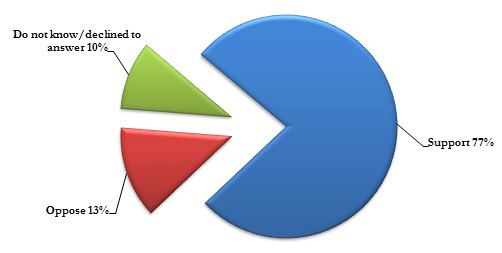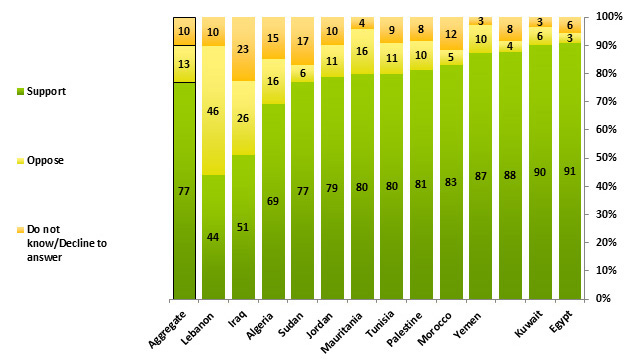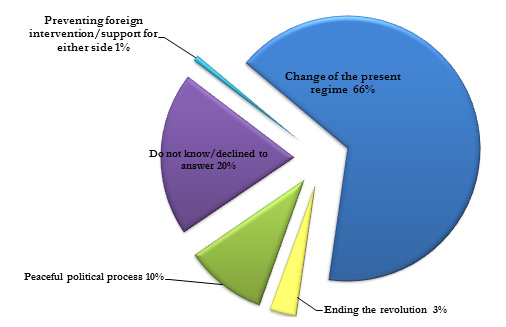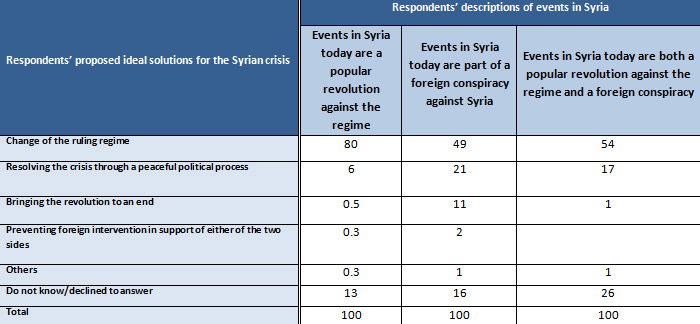Results from a 2012 Arab Opinion Index, conducted by the Doha-based Arab Center for Research and Policy Studies, in conjunction with a number of local partners in 13 Arab states, indicate that there is somewhat an Arab-wide consensus on the Syrian question. The results show that 77% of the respondents agreed with the statement "It would be better for Syria today if Bashar al Assad stepped down from power." Only 13% of the respondents were opposed to this statement, while 10% offered no response.
 |
| Figure 1 Respondents' attitudes to the statement "It would be better for Syria today if Bashar al Assad left power" |
The results further indicate that the majority in 12 of the 13 countries surveyed, supported this conclusion. The only exception was Lebanon, with public opinion being divided: 44% of the Lebanese population surveyed supported removing Assad while 46% were opposed to his leaving power. In some countries-Egypt, Kuwait, Yemen, Saudi Arabia, Morocco, Palestine, Jordan, Sudan, Algeria-support for Assad leaving power was nearly unanimous. In Egypt, 91% of the population supported Assad's downfall, as did 90% of Kuwaiti respondents, 88% of Saudi respondents and 87% of Yemeni respondents.
 |
| Figure 2 Respondents' support for/opposition to the departure of Bashar al Assad by country |
In their answers to open-ended questions, the respondents provided a number of proposed solutions to the Syrian crisis, with responses falling into three main categories:
First: the first category comprises respondents who felt that the solution to the Syrian crisis would be achieved through a change in the current ruling regime. A majority of 66% of Arab public opinion provided answers which came under this category. Respondents whose answers fit into this category can be deemed as supporters of the revolution and opponents of the regime.
Second: the second category of answers is provided by those who proposed bringing the revolution to an end. Respondents whose answers fit into this category can be considered supporters of the regime, and represent 3% of the total responses across all of the Arab countries in which the survey was conducted.
Third: a third category of respondents were those whose proposed solution for the Syrian crisis was a political process in which all political forces took part, provided that the Syrian regime undertook fundamental political reforms. Approximately 10% of respondents provided answers which fit into this category.
19% of respondents declined to provide any proposed solutions to the Syrian crisis, while 1% of Arab public opinion emphasized that no external powers should intervene in the crisis.
 |
| Figure 3 Respondents' proposed ideal solutions to the Syrian crisis |
When it came to describing the events in Syria, responses to the survey show that a majority of 62% of Arab public opinion agreed with the statement "Events in Syria today are a popular revolution against the regime". Meanwhile, 27% of respondents selected the statement "Events in Syria today are the result of a foreign conspiracy against the country". Less than 1% of the respondents indicated that events in Syria were the result of both a foreign conspiracy and a popular revolution, while 11% of the respondents declined to provide an answer.
 |
| Figure 4 Respondents' description and explanation of events in Syria |
A cross-tabulation of the respondents' answers reveals that those who indicated that events in Syria were the result of a foreign conspiracy do not necessarily support the Syrian regime, or that they are opposed to the revolution or call for it to be brought to an end.
When cross-tabulating the answers provided by those who believed events in Syria to be a popular revolution against their proposals for an ideal solution to the Syrian crisis, a majority of 80% are shown to believe that a change of the regime would be the ideal solution. Proposals for the ideal solution were more diverse amongst those who agreed with the view that events in Syria were the result of a foreign conspiracy against the country, 49% of whom indicated that an ideal solution would be a change of regime, while 11% of this group proposed bringing the revolution to an end as an ideal solution. Of the same group, 21% proposed a political process as the ideal solution.
The above results challenge the widespread notion that the belief that the Syrian revolution is the result of a foreign conspiracy amounts to support for the Syrian regime. On the contrary, the results of the Arab Opinion Index show that a majority of Arabs indicated their support for either removing the regime or achieving a solution through a political process.
| Figure 5 Cross-tabulation of respondents' proposed solutions to the Syrian crisis and their description/explanation of events in Syria |
 |